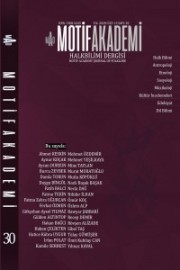KAZAN-TATAR TÜRKLERİNİN HALK ANLATILARINDA ÖLÜM
DEATH IN THE FOLK NARRATIVES OF KAZAN-TATAR TURKS
Author(s): Fatma TekinSubject(s): Anthropology, Sociology of Culture
Published by: Motif Halk Oyunları Eğitim ve Öğretim Vakfı
Keywords: Death; Kazan - Tatar Turks; folk beliefs; folk practices; folk narratives;
Summary/Abstract: It is known that death has a rather evident place in human life being the last phase of life. It has been one of the matters humankind has struggled the most to understand and interpret for its inevitability and the acceptance that comes with it; its obscurity and the fear that comes with it. The feeling of desperation in the face of death, avoiding death, the obscurity the afterlife, and the search for immortality to cling on to life have unavoidably accompanied beliefs about death and the practices that formed around these beliefs. As in all societies, the Turks also attempted to understand and interpret the meaning of death. The way the Turks perceived the soul and the death, and their beliefs and traditional practices formed around death can be seen in the written sources since the earlier times up to the present. As in the Turkic world, death has a rather significant place also for Kazan-Tatar Turks, who managed to preserve their culture although they were subjected to religious and cultural oppression by Russians for a long period. As a widespread theme in the folk narratives, folk beliefs and practices related to death were reflected in the narratives to a large extent. These beliefs and practices at stake can often be seen particularly in epics, legends, and tales that are of folk narratives. This study aims to examine in what way the beliefs of Kazan-Tatar Turks about the death and the soul, and their traditionally shaped practices were reflected on the examples of epics, legends, and tales that are of folk narratives.
Journal: Motif Akademi Halkbilimi Dergisi
- Issue Year: 13/2020
- Issue No: 30
- Page Range: 566-579
- Page Count: 14
- Language: Turkish

